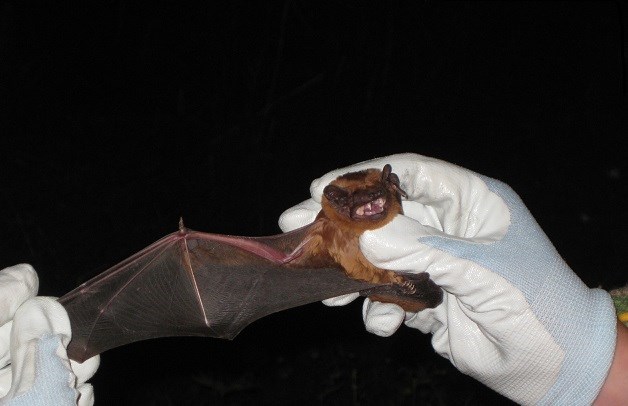Wednesday 10 Aug 2016
Network Rail learns to tell its Noctules from its Natterers as East West Rail experts carry out extensive bat studies
- Region & Route:
- | North West & Central
Network Rail is working with ecologists to carry out an extensive study into what impact the new railway upgrade between Oxford and Bedford will have on the local environment, paying particular attention to a rare species of bat known to roost in the local area.
Experts from Network Rail’s environmental team have been out at dusk and dawn, trapping and tagging bats at key areas along the project route. The aim is to understand whether or not some very rare Bechstein’s bat, known to roost in the Sheephouse wood/Bernwood Estate area near Aylesbury are also present in other areas of the scheme.
The project team has already carried out extensive studies including watching surveys at potential roosts and the use of automatic ‘listening’ bat detectors.
Lucie Anderton, senior environment manager for Network Rail said: “Simply from recording their calls, we already have a good understanding of the numbers and types of bats that use the existing rail corridor and surrounding habitat, however some species can only be identified by trapping them
“We are very interested to find out if any of the rare Bechstein’s bats are present outside the Sheephouse/Bernwood area. These bats are associated particularly with ancient woodland habitats and so the trapping surveys are very focused.”
East West Rail aims to improve the east-west connectivity through improved public transport in order to support economic growth, prosperity and employment in the area and to introduce faster and more reliable train services between Oxford, Cambridge and East Anglia.
So far, Noctule, Natterers, Daubenton’s and Common Pipistrelle bats have been tagged and surveys are now being paused due to the female bats being heavily pregnant or having pups in their maternity roost. The surveys will continue later in the summer.
The surveys will help the East West Rail engineering team understand how the project might affect bats and also help design mitigation to ensure their population in the area continues to thrive.
Further information about East West Rail can be found at www.networkrail.co.uk/east-west-rail/ andwww.eastwestrail.org.uk/
ENDS
Notes to editors:
The East West Rail Phase 2 project involves upgrading and reconstruction of existing and mothballed sections of line linking Bedford-Bicester and Milton Keynes-Princes Risborough. The reopening of this line will:
- Provide a strategic east-west route linking key centre of economic activity
- Provide connections between routes without passengers having to go via London
- Deliver better connectivity between urban centres
- Help reduce congestion on local roads
- Contributes to economic growth
- Provides a sustainable means of transport
It will create new journey options including:
- Oxford and Milton Keynes, stopping at Oxford Parkway, Bicester, Winslow and Bletchley.
- Oxford and Bedford: stopping at Oxford Parkway, Bicester, Winslow, Bletchley, Woburn Sands and Ridgmont.
- Milton Keynes to Aylesbury and London Marylebone: an extension of the existing service between Marylebone and Aylesbury Vale Parkway with stops anticipated at Bletchley, Winslow, Princes Risborough and High Wycombe.
- New freight route opportunities.
Contact information
Passengers / community members
Network Rail national helpline
03457 11 41 41
Latest travel advice
Please visit National Rail Enquiries
Journalists
Network Rail press office -London North Eastern & East Midlands route
01904 383180
mediarelations@networkrail.co.uk
About Network Rail
We own, operate and develop Britain's railway infrastructure; that's 20,000 miles of track, 30,000 bridges, tunnels and viaducts and the thousands of signals, level crossings and stations. We run 20 of the UK's largest stations while all the others, over 2,500, are run by the country's train operating companies.
Usually, there are almost five million journeys made in the UK and over 600 freight trains run on the network. People depend on Britain's railway for their daily commute, to visit friends and loved ones and to get them home safe every day. Our role is to deliver a safe and reliable railway, so we carefully manage and deliver thousands of projects every year that form part of the multi-billion pound Railway Upgrade Plan, to grow and expand the nation's railway network to respond to the tremendous growth and demand the railway has experienced - a doubling of passenger journeys over the past 20 years.
Follow us on Twitter: @networkrail
Visit our online newsroom: www.networkrailmediacentre.co.uk

